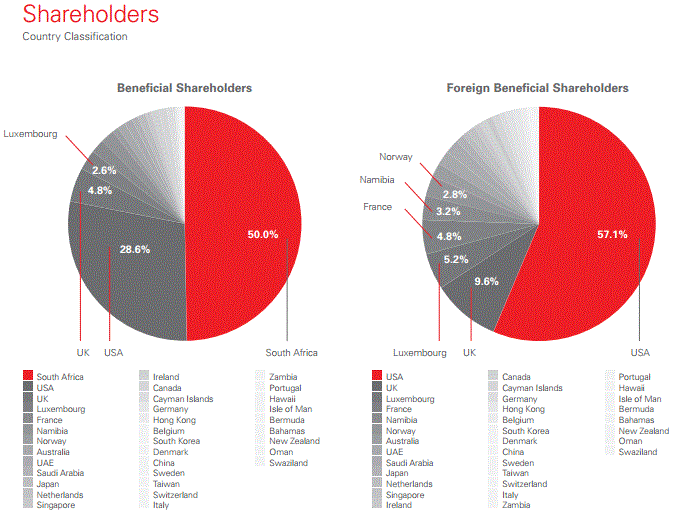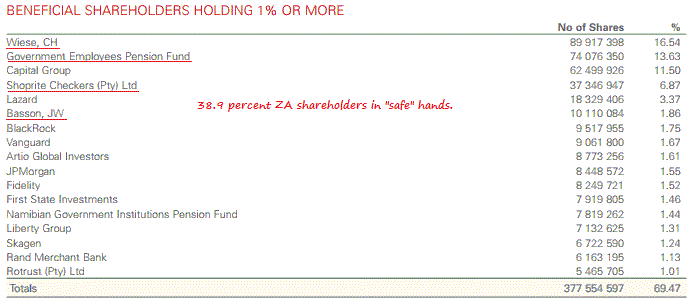Jozi, Jozi. 26o 12' 16" S, 28o 2' 44" E. Financials enjoyed a good day, but banks were where the real action was, up over a percent and one third. I cannot say for sure that I know the answer as to why, but the banking sector has fallen from grace in recent weeks. Libor perhaps, but probably more likely linked to the ABSA trading update, which definitely spooked the markets. As at April 19, ABSA and the overall index had hugged each other for the better part of a year. But from that point onwards ABSA has underperformed the broader index badly, with the overall index flat (up 1.8 percent) and ABSA down 13.5 percent. The overall market over the same time frame is off one percent. So, it is fair to say that ABSA has been stinking up the joint, mostly with that one day drop back in late June, remember we wrote about it, if you need the refresher: ABSA warning sends share price over eight percent lower!.
Yesterday the Jozi all share index lost 0.13 percent to end at 33737, not exactly flying. If you know what I mean! OK, that was dull, not too witty this morning, I ran a crushing run in the wee hours, that was a little too taxing. Fast is a relative term, I am still very slow. Working on that though.
All the retailers are starting to hit us with trading updates, firstly Shoprite Checkers hit us with a trading update yesterday afternoon. It looked like a slight miss to me, the market was initially disappointed with the number. You can read for yourself on the Shoprite Checkers website: Operational Update. Or you can just carry on reading here, copy paste style: "For the 12 months to June 2012 the Group increased total turnover by 14.4% to about R82.7 billion, compared to the corresponding 12 months of 2011. Growth on a like-for-like basis was 8.5%. During the 2012 reporting period, internal food inflation averaged 4.9% compared to -0.1% in the 2011 reporting period."
OK, so what does that mean for Shoprite Checkers, because these are full year numbers of course? The expectations, the consensus as far as I could tell was six Rands worth of earnings for the period, which puts the stock on a forward multiple of close to 26 times. Relative to their peer group, this makes them the most expensive stock around. The dividend yield is not too much to talk home about, less than two percent forward. Earnings are expected to grow by just less than 20 percent per annum for the next two years. At current share price levels then, that puts the stock on a forward earnings multiple (2014) of around 19 times. Which still sounds too expensive. BUT, and this is where you must pay attention, most of these companies are showing really decent (in comparison) top and bottom line growth. And this is what you have to lean in closer to your screen. Take a look at the shareholder make up of Shoprite Checkers, taken from their last annual report:

As you can clearly see from the above graphic, Shoprite shareholders (as at the last annual report) were half South Africans and half foreign ownership. But it gets even narrower than that when we start talking about South African ownership, check out the table of shareholders, I have underlined the "safe" South African hands of owners of the business and you can quickly see that the price makers are not us. They are foreign share holders, and mostly dominated by Americans.

See that? Amazing hey, the PIC, Christo Wiese (Mr. Suitcase), Whitey Basson and Shoprite Checker (Pty) Limited own nearly 39 percent of the business. So that is nearly 80 percent of the South African shareholders who are not sellers, in fact if anything the PIC would be slow acquirers of the shares. It is then completely fair to say that the share price is set by the Americans and what they are willing to pay by way of valuations. Wal-mart Mexico trades on 34 times earnings. Yes, sports lovers, 34 times, and Wal-mart Mexico is valued at 50 billion Dollars on that lofty valuation. Whereas Shoprite has a market cap of 90.5 billion, at 8.18 that is a little over 11 billion Dollars. So whether this valuation is too much to stomach for South African investors is not the question to ask here, it is whether they can keep pace with their international counterparts, such as Wal-Mart Mexico. And let the emerging market funds determine what they should pay. Obviously a cooling or earnings miss then comes with great risks to the share price.
Woolies also released a trading update this morning, and it looks good to me, Mr. Market has the stock flat at the beginning of the day, so you could say that this was anticipated to some extent. The share price has been on an absolute tear, but so has the sector. Over the last 12 months the stock is up a whopping 70 percent. Wow. But this might seem a little light for Mr. Market as they digested it through the morning, the stock eventually took some tap. Here is the TRADING UPDATE AND TRADING STATEMENT from their website SENS portal. So expectations are for a 20 to 30 percent increase in both HEPS and EPS for the 52 week period to end June 24 2012. Remember at the half year stage, when we wrote up about Woolies: Woolies results look good, our expectations back then were for around 270 odd cents per share for the full year.
In the middle of the range (25 percent increase) we should expect earnings to be 269 cents per share, which means at the current share price of 52 odd Rands, the stock trades on 19.3 times earnings. With expectations pretty lofty, and seeing that the market is looking for 20 odd percent increase in earnings next year (and 17 odd percent the year after) the valuations seem just fine to me. What people are paying up for though is the yield, they are a very generous crowd. The prospective yield is around three and a third of a percent to June this year and rises to beyond four percent the year after AND nearly touches 5 percent the year after that, 2014.
But, the shareholder makeup is not the same as Shoprite and as per the 2011 annual report major shareholders are South African. The PIC owns (owned, as at June 2011) 17.22 percent of the business. And Woolworths holdings limited (the staffers) are the second biggest holders of the stock, with over 6 and a third of a percent of the business. So, I am just guessing here, but it is not going to get the same market rating as Shoprite. Perhaps they would do well to attract a different subset of shareholders, what about a road show? Ian? Buddy?
Byron's beats explores one our favourite themes, payments and our preferred stock in the sector, Visa. Great to have these beats back! Poor Byron went all the way to Knysna for a run, but they cancelled after all the flooding. At least he ate a couple of oysters. Nice, if that is your thing of course.
- Visa is now our third most widely held stock in the US portfolio behind Apple and GE. So when big news concerning the company is released it is important to cover it. The biggest risk facing Visa comes from regulation and lobbying from merchants. Remember that they are not a financial institution and they take no credit risk. They process payments and take a small percentage.
Yesterday a pending deal with plaintiff's valued at $7.25bn was announced but is not yet final. This is from cases opened as far back as 2005 that claimed that Visa, Mastercard and some of the banks colluded over fees known as interchange which retailers pay each time a consumer swipes a card. Anti competitive agreements meant that retailers were paying inflated fees and now want pay back.
The announcement yesterday came up with a figure of $6.6bn of which Visa are responsible for 67% or $4.4bn. This amount has been more then covered for by the company hence the stock was actually up 1.8% yesterday. In fact $12bn was a potential figure for the combined settlement so $6.6bn looks a lot better.
What does this mean for investors? The companies have admitted guilt by provisioning for the fine but it has been factored into the share price a long time ago. These kinds of things do happen and they are potential risks. I have written about this before but I will mention it again. Yes, if there is collusion and fees are unnaturally inflated then there should be repercussions. But retailers should realise what these companies have done for their industry. By making it a lot easier to purchase goods without having to have cash can only be good for the retailers. They should not shoot themselves in the foot by lobbying these guys out of business.
The margins are huge so this will of course not happen but you do not want things heading in that direction. And what about regulation? Well it looks like more transparency will be the crux of it all. Disclose the surcharge at the point of sale so that customers know where their money is going. From there, I do not think clients will care. It is a lot better than queuing at the bank every pay day to get cash. Now that we are starting to see some clarity and once the overhang is gone, the Visa share price will carry on growing as more and more people embrace electronic payments.
Currencies and commodities corner. Dr. Copper is last at 347 US cents per pound, the gold price is steady at 1592 Dollars per fine ounce. The platinum price is also slightly higher at 1421 Dollars per fine ounce. The NYMEX WTI price is higher at 88.71 Dollars per barrel. There have been some important numbers from Coke, a beat, Goldman Sachs, also a comfortable beat, but a slight disappointment from Johnson & Johnson. 17 S&P 500 companies report today, it is a busy time for earnings, both this week and the next. US futures are higher and have taken us higher with them too.
Sasha Naryshkine and Byron Lotter
Follow Sasha and Byron on Twitter
011 022 5440
No comments:
Post a Comment